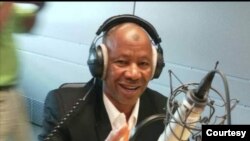Niger’s media have paid tribute to Gremah Boucar, a radio journalist lauded for his efforts to promote and defend press freedom.
Boucar was repeatedly threatened and jailed for his journalism in Niger. He persevered nonetheless.
When he died March 8 at a hospital in Tunisia, the 63-year-old left behind the privately owned Anfani radio and TV network and a legacy of fighting to deliver uncensored news across Niger.
Boucar was “a great defender of press freedom since the advent of democracy and political pluralism in our country,” Lamine Souleymane, deputy chair of Niger’s Independent Radios and TVs Network, told VOA.
Boucar helped found the network in 2016 and served as its chair from 2018.
“From Gremah,” Souleymane said, “I learned how to protect journalism, the rights of journalists and the rights of media.”
Freedom isn't free
Boucar was dedicated to the cause of press freedom, even as Niger went through periods of political instability, with two coups in the 1990s and stretches of single-party and military rule.
“Since freedom is not going to be given to us, we will have to take it,” Boucar said when he accepted a 1998 International Press Freedom Award from the New York-based Committee to Protect Journalists (CPJ). “In spite of the persecution, we continue to fight, uncompromised, for our right to practice our profession and inform the citizens.”
He continued to champion that cause, winning other accolades, including from the International Press Institute in 2000.
Boucar also refused to be stopped by direct threats and attacks.
In March 1997, five armed men in military uniforms broke into his station in the capital, Niamey, and they destroyed equipment estimated at the time to be worth $80,000, CPJ reported.
But Boucar and the Anfani team went back to work.
"We saw how he participated in the writing of the history of democracy’s defense in Niger,” Souleymane said of Boucar in a phone interview with VOA.
Recruited for Hausa Service
Boucar began his journalism career with state-run radio in Niger. He was recruited as one of the first contributors for VOA’s Hausa Service when it began radio broadcasts in January 1979.
In 1989, he helped launch Radio Anfani, one of Niger’s few privately owned radio stations. It added a TV station in 2015 and has offices in Niamey and elsewhere.
“Our goal was to break the government’s broadcast monopoly,” Boucar said of Anfani, a Hausa-language word for “useful,” in his CPJ address.
From the start, Radio Anfani offered a variety of news and entertainment. It also provided a platform for a range of voices, including from opposition figures.
Boucar himself held political office, serving in Niger’s National Assembly from 2004 to 2009 and as a council member for Maine-Soroa, his hometown in southeastern Niger’s Diffa region, from 2004 to 2010. He was Maine-Soroa’s deputy mayor in 2021.
But his passion was journalism, he once told VOA’s Hausa Service in an interview.
He led the Nigerien Association of Independent Press Editors from 1996 to 2000 and worked to promote independent journalism in what rights groups have described as a challenging space.
Niger still 'under attack'
"In 1998, Gremah Boucar was honored with CPJ's International Press Freedom Award, which recognizes courage in journalism around the world. Unfortunately, over 20 years later, press freedom in Niger remains under attack,” CPJ’s Africa program coordinator, Angela Quintal, said in an email to VOA. “In recent years, journalists have been jailed and prosecuted for their work, including under the country’s 2019 cybercrime law."
Reporters Without Borders said in its 2021 World Press Freedom Index that “Niger has seen a significant and encouraging fall in press freedom violations … but there are still many grounds for concern.”
Those include little state advertising with privately owned media, limited public information, and restrictions on journalists’ access to some areas where terrorists are active. Niger in 2021 ranked 59th out of 180 countries, where 1 is freest. It was a two-point decline on the global index.
The Anfani Media Group is an affiliate of VOA and the German broadcaster Deutsche Welle.
VOA Hausa Service’s chief, Aliyu Mustapha, praised Boucar’s professionalism and noted, “He was a mentor to many upcoming journalists. … He impacted quite a lot of people.”
One of them is Issouf Mammne, an Anfani journalist in Niamey. Boucar was not just his boss but also a friend and journalism teacher. Boucar’s death, Mammne said, was a "huge loss."
This report originated in VOA’s Africa Division and its Hausa and French to English services. Contributors include Souley Moumouni Burma reporting from Niamey, Niger; and editors Timothee Donangmaye and Carol Guensburg in Washington.








